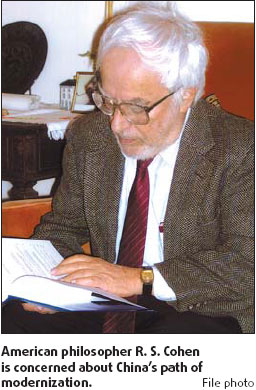Full Marx for a scholar's generous donation
Eighty-four-year-old American philosopher R. S. Cohen is well known for his Marxist studies and passion for China. To fulfill that sentiment, Cohen recently donated his personal collection of 20,000 books to the Tsinghua University Library in Beijing.
"Although many universities in other countries (offered to take my collection), I am still inclined to China, and China is my best choice," he says.
In August, a special session called "Philosophy of Science: Cohen and China" was held in Beijing, attracting renowned Chinese philosophers, such as Fan Dainian, Qiu Renzong, Cao Tianyu and Lin Chun. This is the fifth time Cohen has visited China since his first trip in 1985.

"Before Cohen, there was not much exchange between the Chinese philosophy of science circle and the external world," says Fan Dainian. "His visit greatly influenced the Chinese academia."
Looking back, Cohen says his interest in China was greatly encouraged by his encounter and friendship with English scholar Joseph Needham. Cohen graduated from the physics department of Wesleyan University, worked in radar research during World War II, and later obtained a doctorate in physics at Yale.
Not only did he teach physics and philosophy, he also studied Marxism as early as in the 1940s and offered "critical Marxist studies" at Yale in the early 1950s.
Cohen was not a Communist party member, but as a Marxist scholar he was persecuted by McCarthyism and lost his job teaching in Wesleyan. He then won a research fellowship to go to England where in Cambridge he met Needham who is famous for his great studies of the history of Chinese science and technology and loved China. This helped lay a foundation of Cohen's "intimacy" with China.
This feeling of "intimacy" became closer in the early 1980s when Chinese philosopher Fan Dainian recommended Wu Zhong to Cohen as a research student. Cohen had already taught in Boston University for many years and was the director of the BU Center for the Philosophy and History of Science. Wu was his first doctoral student from the Chinese mainland and also helped him make some active contacts with the Chinese academia.
In 1985, the Association of Journal Dialectics of Nature under the Chinese Academy of Sciences invited Cohen to visit China and again in 1988 to give lectures. During these visits, he met with the Marxist scholars Yu Guangyuan and Gong Yuzhi, and became a good friend of Hong Qian as well, who was an expert of logical empiricism.
In 1988, he also visited the philosopher Feng Youlan, whose History of Chinese Philosophy helped him to know more about philosophical ideas in the Chinese tradition. Meanwhile, more scholars and students went to Boston University and the BU Center through Cohen.
Cohen's lectures were of the nature of enlightenment, all involving the cutting edge problems in the field.
Since the teaching of Marxism was quite dogmatic then, Cohen tried to shake up the Chinese thinking and his interpretation of Marx's "religion as the opium of the people" comment differed greatly from the conventional Chinese understanding.
He views that Marx and Engels never simply rejected religion as a whole, they rather insisted on historical and concrete analysis. He also points out that science and religion are not strictly in opposition with each other.
Cohen says he has been a person who deliberately broke all kinds of boundaries and limits. He broke the gaps between science and the humanities by writing a superb physics textbook for humanities students. Even within the philosophy of science, he has written and edited in analytical philosophy, phenomenology-hermaneutics, as well as Marxism.
At the same time, he holds a critical attitude towards his Chinese sentiment. "My feeling for China has not been purely abstract and objective. There are personal subjective factors, including some romantic sentiment on my part for a Chinese woman, which was no secret, indeed shared with my wife," Cohen jokes.
Concerning today's China and the world, Cohen says he is a short-term pessimist and long-term optimist. For him China has achieved many developments in recent years but also encountered certain dangers.
For example, in 1985, there were flows of bicycles but now they became cars. This might be a progress yet is also dangerous. By danger, he referred firstly to the uncertainty of whether China can uphold the idea of market socialism, and, secondly, whether China's own cultural tradition can be critically respected.
Cohen hopes that intellectuals in China would seriously look into the question of the Chinese path of modernization, which would contribute greatly to global thinking.
(China Daily 10/09/2007 page19)














